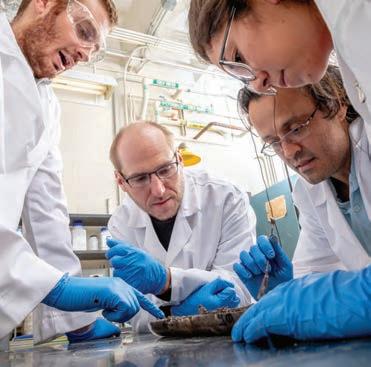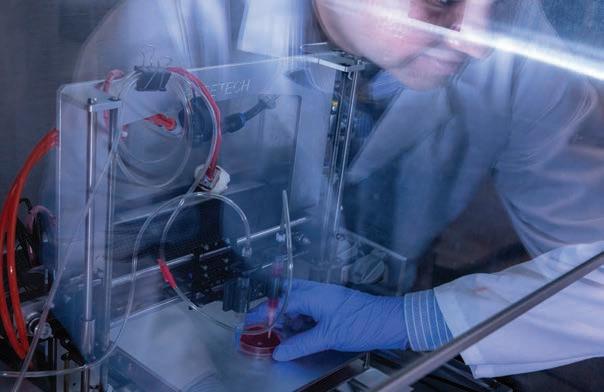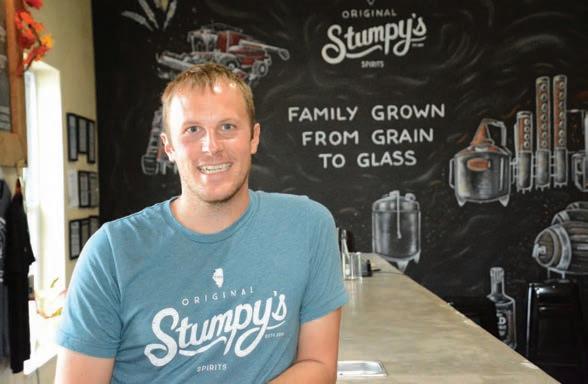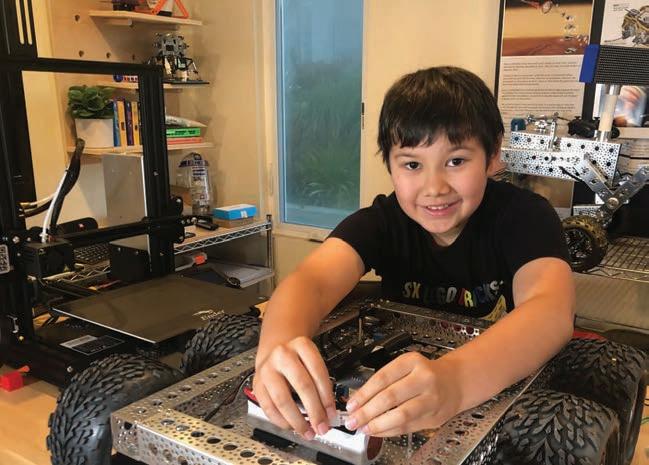
4 minute read
e sky is no limit
from Missouri S&T Magazine, Summer 2020
by Missouri S&T Library and Learning Resources | Curtis Laws Wilson Library
THE SKY IS NO LIMIT
Danielle Gines comes from a musical family in Bunker Hill, Ill., and she is always singing. But it was her interest in science and aviation that drew the Illinois transfer student to Missouri S&T and the Air Force ROTC program.
“I have a passion for anything related to air and space and flight,” says Gines, a senior in aerospace engineering.
At 28, Gines is finding success in her major and in the ROTC. In 2019, she earned a spot in the highly competitive Freefall Program at the Air Force Academy in Colorado Springs. e skydiving program only takes 49 students from across the U.S., and Gines trained for four 10- to 12-hour days before making her first solo jump out of a plane.
“I was the first person out of my plane,” says Gines, who describes herself as a thrill-seeker and adrenaline junkie. “I jumped out, and I was under my canopy and looking at the beautiful scenery. After my first jump, I was ready for flips and tricks.”
Gines’ ROTC commander praises her emotional intelligence, servant leadership and willingness to take on any challenge.
“Danielle is one of the most mature cadets and phenomenal leaders I have worked with in my entire AFROTC career,” says Col. Brent Unger, former commander of Air Force ROTC Detachment 442 on the S&T campus. “Danielle aspires to become an astronaut, and she is already well on her way.” e former music major also found a way to keep music in her life, singing with the Missouri S&T Chamber Choir.
“As much as I love science, one specific part of your brain gets overloaded,” says Gines. “Pulling back and doing something artistic is a nice release.”
When Gines graduates in May 2022, she will commission as a second lieutenant, and she hopes to earn a spot as a pilot in the Air Force and work her way up to becoming an astronaut.
“I love being close to the sky and space,” she says. “You have a completely new perspective on the world.”
GLOBAL ENGINEERING PROGRAM LAUNCHES THIS FALL
Missouri S&T will take a purposeful step this fall to prepare engineering graduates for international careers with the inauguration of a new Global Engineering Program (GEP). e program will equip engineering graduates with the skills and cultural awareness they need to meet complex global career challenges — challenges that could revolve around worldwide food security, medical advancements, energy production, environmental improvements or the expansion of global supply chains, says S&T Chancellor Mo Dehghani. e program allows engineering students to earn two degrees simultaneously in five years while increasing their intercultural competence and proficiency in another language. Upon completion, GEP graduates will hold a bachelor of science degree in an engineering field and a bachelor of arts degree in multidisciplinary studies with an emphasis in language and culture. e fall 2020 program launch includes French and Spanish language options. e university plans to add German and Russian in the future. In addition to completing the GEP’s liberal arts course component, students will study abroad and complete an international engineering internship that combines with their interests.
“A degree from Missouri S&T is widely recognized as an exceptional value,” says Richard Wlezien, vice provost and dean of S&T’s College of Engineering and Computing. “A dual degree with international experience provides them an even greater edge — they will be uniquely positioned to work on global teams and provide leadership on an international scale.”
Audra Merfeld-Langston, chair of arts, languages and philosophy and associate professor of French, and Lesley Sneed, associate professor of civil, architectural and environmental engineering, co-direct the program.
IS THERE NICKEL IN ‘THEM THAR HILLS’?

Major discoveries of metals with scientific and economic significance — metals like nickel, copper and platinum — are becoming few and far between, which seems to suggest that most deposits that are easy to access have already been found.
But with funding from a three-year, $550,000 NSF Faculty Early Career Development (CAREER) award, Marek Locmelis (pictured above, center) plans to dig deeper to find more.
Locmelis, an assistant professor of geosciences and geological and petroleum engineering, studies where these metals come from, how they are transported and where they are most likely to be concentrated in mineable deposits.
“Most known world-class metal deposits formed relatively close to the Earth’s surface,” he says. “However, a recent decline in major discoveries suggests that most of the easily accessible, nearsurface deposits have already been found. To guarantee a steady metal supply in the future, we must look at deeper levels in the Earth, which the CAREER award will help me to do.” e CAREER award supports early career faculty who have the potential to serve as academic role models in research and education and to lead advances in the mission of their department and organization.
Locmelis is an economic geologist with expertise in geochemistry, petrology, planetary evolution and analytical chemistry.
In addition to research on metal deposits, Locmelis also studies supply chain resilience for critical minerals, such as cobalt and rare earth elements. He is the workshop chair for an NSF-supported workshop on supply chain resilience that is tentatively scheduled to be held on the Missouri S&T campus later this year.
He also studies how metals and other contaminants are redistributed during catastrophic flood events and investigates the geochemical evolution of the deep interiors of planets and protoplanets. By studying if, and how, oxygen that is bound in minerals and magmas in the interiors of planetary bodies can aect the composition of oceans and atmospheres, Locmelis can begin to predict whether or not a planet is habitable.









